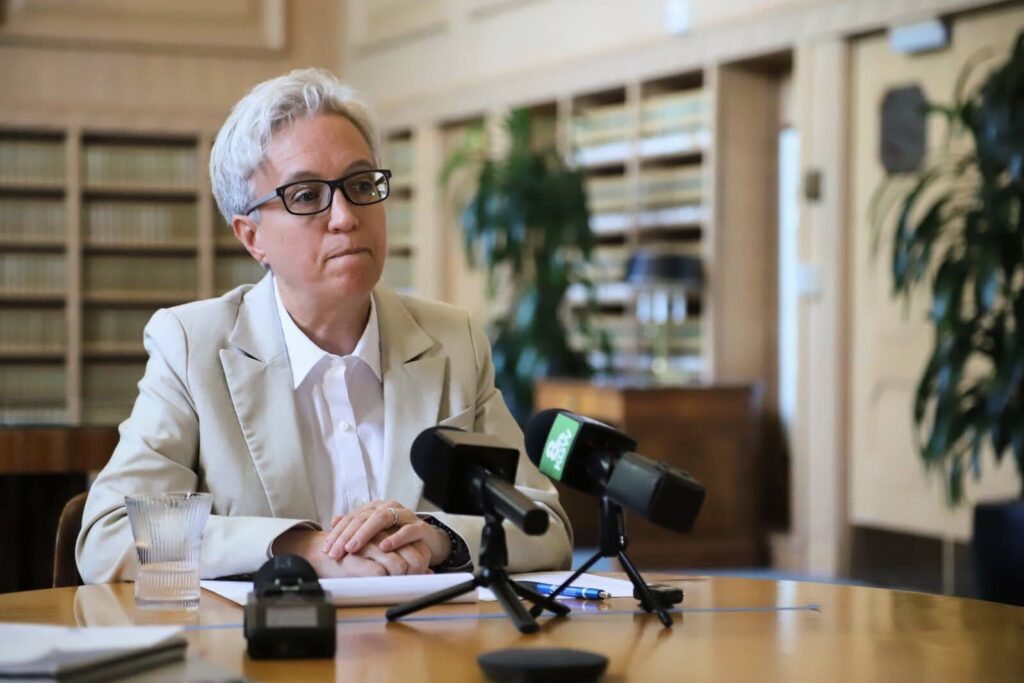Gov. Tina Kotek, who has been one of the loudest voices urging lawmakers to set aside a
dedicated funding stream
to mitigate against and fight wildfires, on Monday said she’ll take what she can get from legislative budget writers while that conversation continues.
That was the clearest signal to date that lawmakers are unlikely to
deliver a large and sustainable
source of long-term fire funding this session.
With only 13 days until they must end the session, by June 29, lawmakers still have not put forward a package to pay for wildfire mitigation and suppression on an ongoing basis, a priority for Kotek and some legislators. Democrats have pushed for a new source of funding to pay for those efforts, while Republicans have argued that paying for fire is a matter of rearranging the state’s existing budget.
Kotek on Monday suggested that she’s losing hope that lawmakers solve the wildfire funding problem long-term this session. She urged them to still find “as much one-time funding as they can for wildfire suppression and mitigation to help keep our community safe.”
“Let’s do what we can this biennium and then keep working on the long-term funding stream,” Kotek said. “I wish we had one identified. We’re not there this session. I’m not going to cry about it. But I want more money for the biennium so we can have these things addressed. Even if it’s one-time.”
A legislatively formed work group made up of a diverse cross section of timber, environmental, ranching and firefighting stakeholders
asked lawmakers to find
$280 million they said was needed to pay for wildfire work each biennium. About $150 million of that would be set aside to pay for the cost of putting out fires and the other $130 for fire readiness and prevention.
The group put forward six potential fire funding solutions, including diverting money from reserves and setting aside dollars that flow into the state’s general fund. Only two ideas suggested a new funding source. None of those ideas are technically dead, but not one appears to have full-throated support.
New ideas have begun rising to the top of the potential funding list for lobbyists and lawmakers working on a wildfire package, including using the interest generated from the state’s Rainy Day Fund, which is set aside to help stabilize the state in an economic downturn. The idea to use the fund’s interest, which is championed by southern Oregon Republican Rep. Werner Reschke, could generate about $160 million for the biennium.
Kotek said on Monday that she’s “strongly advocating” for that approach for the next two-year state budget.
Lawmakers could do that on an ongoing basis, she said, but she doesn’t think it’s “a great long term solution” since the value of the interest will fluctuate depending on how much money is in the rainy day account.
“I see no reason, no reason why (lawmakers) can’t get that, at least, done this session,” Kotek said.
The governor had previously told reporters that she was
entertaining conversations
about an idea by Democratic Sen. Jeff Golden of Ashland, who supports diverting Oregon’s next personal income tax “kicker” rebate into a savings account to pay for wildfire on an ongoing basis. Kotek told reporters in late May that potentially using a portion of that $1.6 billion kicker to support rural Oregon “would be a beneficial approach.”
The governor has since distanced herself from the kicker idea
and told reporters they’d misinterpreted her position.
She’d always been in favor of “taking a portion of one-time money” to dedicate funds for wildfire, she said last week.
On Monday, Kotek said plainly that she didn’t think legislative leaders had the votes to hold back a portion of the kicker and that “I think we have to focus on other things.”
“I wish we’d had more time to actually develop this conversation in a way that we could have had some success,” she added. “At the end of the day, a very small portion of that kicker money for our very, very high income earners could be set aside to help us all fight fire.”
Golden initially favored
setting aside the full
personal income tax kicker to establish a wildfire fund that could generate some $160 million each biennium for wildfire. His bill to do so is still alive, but
it’s parked
in the Senate Revenue Committee with no vote scheduled.
In recent weeks Golden has been planning to tweak the proposal to make it more palatable to a wider array of lawmakers. Republicans have called holding back the kicker a legislative third rail, while Golden would need their support to divert any portion of the kicker, which requires a two-thirds majority. His new proposal is to return around $600 million of kicker money to Oregonians making less than $95,000 alone or $190,000 as joint filers and keep the remaining billion for the wildfire fund.
Asked about the Governor’s comments on Monday, Golden said he’s not throwing in the towel. He sees his bill as an important component of a long-term funding source for wildfire.
“I’m not giving up. I’m going to fight for this as long as it’s still in play,” he said.
Sami Edge covers higher education and politics for The Oregonian. You can reach her at
sedge@oregonian.com
or (503) 260-3430.
Latest local politics stories
-
Voters increasingly skeptical that Portland-area homeless services tax is working, poll shows
-
New Oregon law is supposed to help sex-trafficked women living in massage parlors, but will it?
-
Portland ‘does not require’ National Guard intervention after protests, mayor says
-
Crying in the Oregon Legislature: Lawmakers keep breaking into tears, unheard of a generation ago
-
Oregon elected officials decry political violence following shootings of Minnesota lawmakers





More Stories
‘Take what I can get’: Kotek signals long-term wildfire funding solution unlikely in 2025
‘Take what I can get’: Kotek signals long-term wildfire funding solution unlikely in 2025
‘Take what I can get’: Kotek signals long-term wildfire funding solution unlikely in 2025